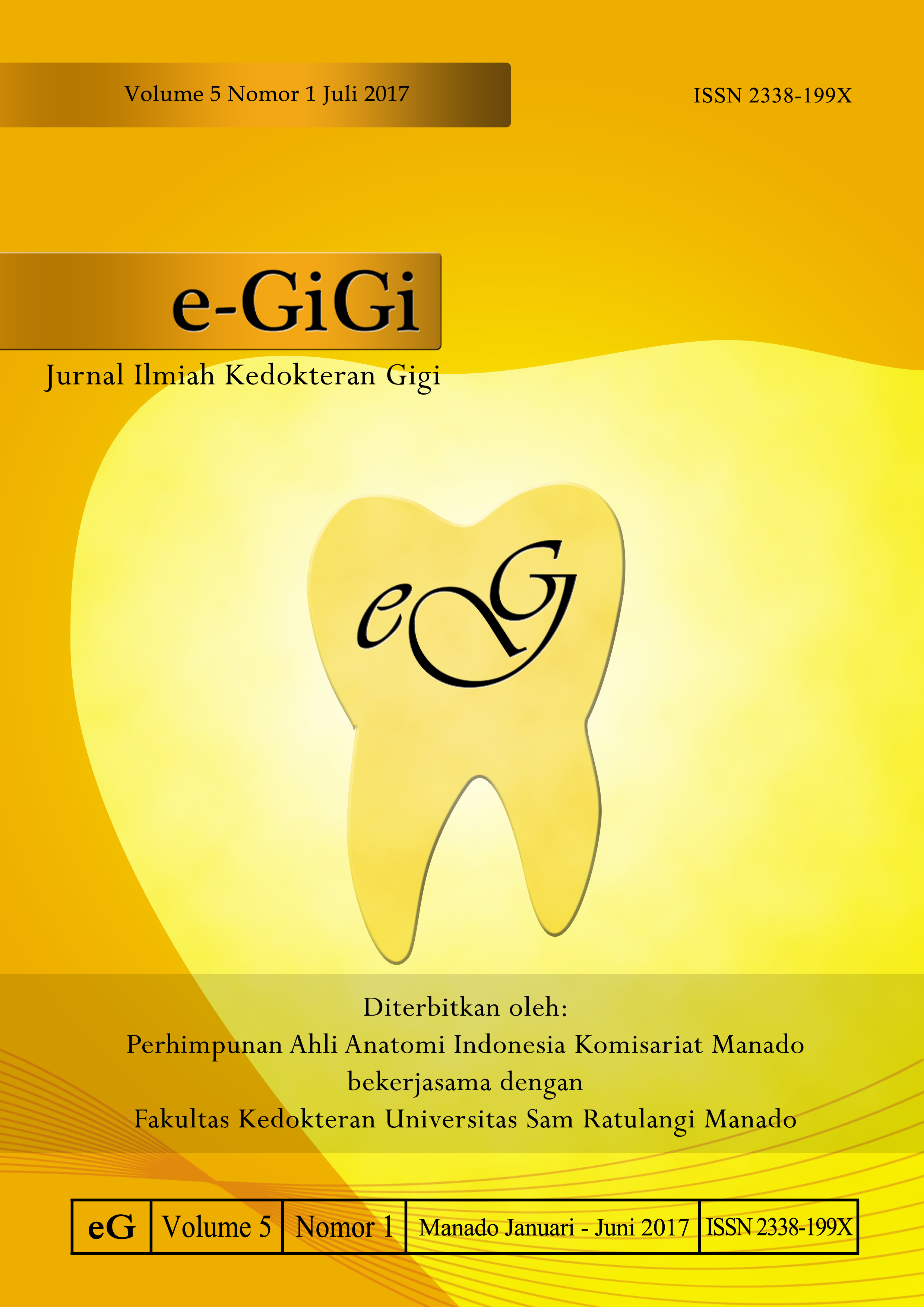Uji daya hambat ekstrak daun cengkih (Syzygium aromaticum (L.) ) terhadap bakteri Enterococcus faecalis
DOI:
https://doi.org/10.35790/eg.5.1.2017.15547Abstract
Abstract: Cloves (Syzygium aromaticum L.) grow widely in Indonesia. This plant has many benefits from its stem, leaves, and flowers. Clove leaves has several antibacterial compounds such as flavonoids, tannins, and triterpenoids, as well as eugenol as the major component of essential oil. Enterococcus faecalis is a facultative anaerobic Gram positive bacteria and normal flora in the mouth. These bacteria are often identified as the cause of the failure of root canal treatment. This study was aimed to determine the effectiveness of clove in inhibiting the growth of bacteria Enterococcus faecalis. This was an experimental study with a modified method of Kirby-Bauer using pits. Samples of clove leaves were obtained from Treman, North Minahasa, and then were extracted by using maceration method with 96% ethanol. Metronidazole was used as positive control. Enterococcus faecalis bacteria were taken from the direct isolation of patients’ necrotic teeth. The results showed that the average inhibition zone of clove leaf extract against Enterococuss faecalis was 8.0 mm meanwhile of metronidazole was 10.0 mm. Conclusion: Clove leaf extract had moderate inhibitory effect against the growth of Enterococcus faecalis.
Keywords: clove leaves, Enterococcus faecalis, inhibition.
Â
Abstrak: Tanaman cengkih (Syzygium Aromaticum L.) banyak tumbuh di Indonesia. Tanaman ini memiliki banyak manfaat mulai dari batang, daun, dan bunga. Daun cengkih mengandung berbagai senyawa yang bersifat antibakteri seperti flavonoid, tannin, dan triterpenoid, serta senyawa eugenol yang merupakan komponen utama dalam minyak atrisi. Enterococcus faecalis ialah bakteri Gram positif fakultatif anaerob yang merupakan flora normal dalam mulut. Bakteri ini sering terisolasi sebagai penyebab kegagalan perawatan saluran akar. Penelitian ini bertujuan untuk mengetahui daya hambat daun cengkih (Syzygium Aromaticum L.) terhadap pertumbuhan bakteri Enterococcus faecalis. Jenis penelitian ialah eksperimental dengan metode modifikasi Kirby-Bauer menggunakan sumuran. Sampel daun cengkeh diperoleh dari daerah Treman Kabupaten Minahasa Utara yang kemudian diekstrasi dengan metode maserasi menggunakan etanol 96%. Sebagai kontrol positif diginakan metronidazole. Bakteri Enterococcus faecalis diambil dari isolasi langsung pada pasien dengan gigi nekrosis. Hasil penelitian ini mendapatkan rerata zona inhibisi ekstrak daun cengkih terhadap bakteri Enterococuss faecalis sebesar 8,0 mm sedangkan zona inhibisi metronidazole 13,0 mm. Simpulan: Ekstrak daun cengkih memiliki daya hambat yang tergolong sedang terhadap pertumbuhan bakteri Enterococcus faecalis.
Kata kunci: daun cengkih, Enterococcus faecalis, daya hambat
Downloads
How to Cite
Issue
Section
License
COPYRIGHT
Authors who publish with this journal agree to the following terms:
Authors hold their copyright and grant this journal the privilege of first publication, with the work simultaneously licensed under a Creative Commons Attribution License that permits others to impart the work with an acknowledgment of the work's origin and initial publication by this journal.
Authors can enter into separate or additional contractual arrangements for the non-exclusive distribution of the journal's published version of the work (for example, post it to an institutional repository or publish it in a book), with an acknowledgment of its underlying publication in this journal.
Authors are permitted and encouraged to post their work online (for example, in institutional repositories or on their website) as it can lead to productive exchanges, as well as earlier and greater citation of the published work (See The Effect of Open Access).






